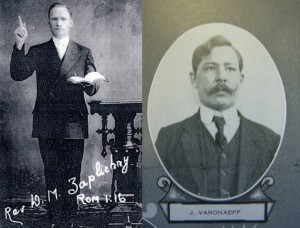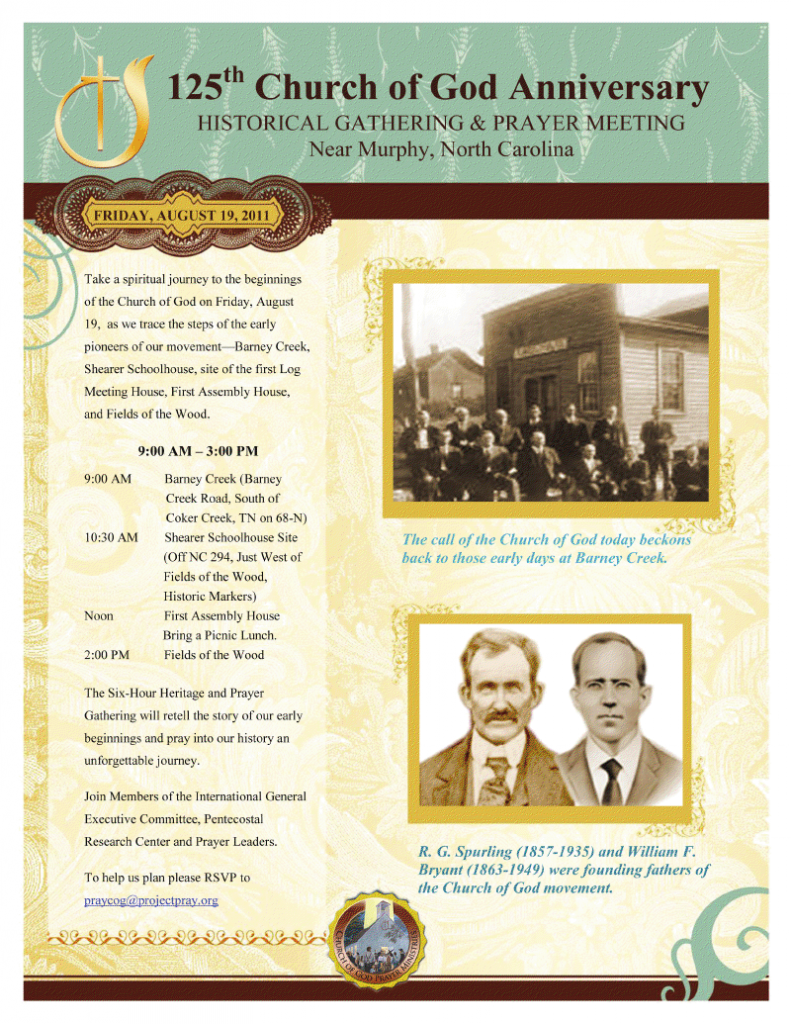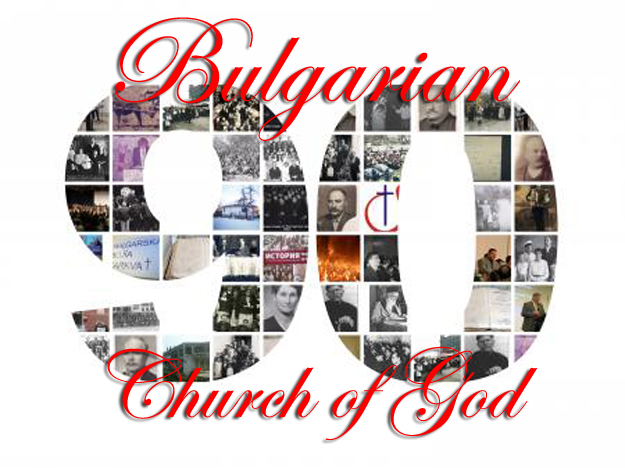The Bulgarian Church of God Celebrates its 90th Anniversary
Excerpt from “Spirit-Empowerment of the Poor in Spirit: Dr. Nicholas Nikolov and the Establishment of the Bulgarian Assemblies of God in 1928” presented at the Missions & Intercultural Studies Interest Group, 47th Annual Meeting of the Society for Pentecostal Studies (Lee University, 2018)
In 2018, the Pentecostal Union in Bulgaria is celebrating 90 years since its establishment. The organization of the Bulgarian Assemblies would have been impossible without the leadership of Dr. Nicholas Nikolov. But while Nikolov successfully fulfilled the mission set by the American Assemblies of God, the larger part of Bulgaria’s young Pentecostal movement remained unregistered and mainly underground. Recently published intelligence reports by the Communist Regime propaganda placed the beginnings of the Bulgarian Church of God in 1922-1924 – much earlier than the separation from the officially organized Pentecostal churches. The establishing meeting of the Bulgarian Pentecostal Union in 1928 simply reaffirmed the already existing division among Bulgarian Pentecostals and the beginning of the Bulgarian Church of God. The year 2018 rightly marks its 90th anniversary.
Unregistered Pentecostal Churches and the Underground Bulgarian Church of God
The larger majority of Pentecostal churches in Bulgaria remained reluctant to join the Pentecostal Union with particular skepticism toward registering with the government in 1928. Many perceived the new organization with 20 members led by Nikolov as betraying the original Pentecostal message brought by Zaplishny and Voronaev. As the older Pentecostals in the country saw it, a young man sent from America, took a dozen of believers and formed a new organization – nothing others have not done before him.
Almost immediately a prophetic word was given to Spas Stefanov,[1] in whose Sofia home Pentecostal meetings were held. The prophecy was from the book of Isaiah 8:10-12: Say ye not, a confederacy[2] [union], to all them to whom this people shall say, a confederacy [union]; neither fear ye their fear, nor be afraid.
No more than a fortnight later, the largest recorded earthquake in Bulgaria occurred and was immediately seen as divine confirmation; especially when taking under account, that its epicenter in Chirpan, and the close-by Plovdiv and Mirichlery, were renowned cities of Pentecostal Evangelical work at the time. The effect was much like the Great Earthquake of San Francisco during the Azusa Street Revival. Another confirmation to the prophecy was seen during the following winter when the Black Sea froze right at the headquarters of the newly established Pentecostal Union in Bourgas.
With a confirmed prophecy in hand, the majority opposing the new organization was lead by the seven presbyters ordained personally by Dionisey Zaplishny during his first visit in Bulgaria. They accented on the leadership and gifts of the Spirit in the unregistered (free) churches without manmade organization and order. Most of the groups that united around them were in Northern Bulgaria in the cities of Pleven, Lovetch, Etropole, Vratsa, Vidin, Montana, Nikopol, Troyan, and village churches near Ruse, Razgrad and Yambol. Presbyter Stoyan Tinchev formed and led the largest group among them, which grew into an underground movement during the Communist Regime and formed the Church of God in Bulgaria.
Boris Grozdanov, who held direct communication and was personally visited by Swedish Pentecostal evangelist Axel B. Lindgren, led groups in Verdikal/Bankya near Sofia and Pernik (both places visited often by Zaplishney).[3] Many more were located in Southern Bulgaria, between Stara Zagora and the Turkish border at Malko Tarnovo, led by Ivan Broshovsky of Yambol.
[1] Father of pastor Toma Spasov, who was sentenced and deported in the 1980s by the Communist Regime with two other Church of God pastors for leading unregistered underground churches.
[2] Translated in the Bulgarian Bible as “union” and resembling the newly established Pentecostal Union.
[3] Letter from Lindgren instructed him to hold the pure teaching and stay out of organized religion. Recorded December 14, 1930 in Protocol 14 of Minutes of the Executive Committee of the Evangelical Pentecostal Churches in Bulgaria (Personal archive of the author).
Recommended Reading:
- Autobiography of Pastor Dionisey Zaplishny (cir. 1927)
- Dinko Zhelev, former president of the Bulgarian Pentecostal Union (personal archives)
- Diulgerov, D.V. (with statistical data submitted by Dr. Nicolas Nikolov) in Annual Publication of the Theological Faculty at Sofia University – Sofia, 1932
- Donka Kinareva: Family Chronicles by J. Markov (unpublished)
- Joseph Gourbalov, Birth and Early Historical and Theological Development of the Baptist Movement in Bulgaria, 2002
- Letter from Axel B. Lindgren to Boris Grozdanov (April 10, 1930)
- National Archive Records, Ruse – Bulgaria (Archive collection, F319K)
- Nikolov, Nicolas and Martha. Ministerial files, personal papers and family correspondence (1924-28)
- Paul Gourbalov, Birth and Development of the Evangelical Pentecostal Movement in Bulgaria (manuscript)
- Travel Diary of Marry Zaplishna (cir. 1924)
Greek-Bulgarian Interlinear of the New Testament Released on All Saints Day for the 500th Anniversary of the Protestant Reformation
Our decade long work of “Greek-Bulgarian Interlinear of the New Testament with Critical Apparatus Based on Nestle-Aland 27/28 and UBS-5” in Bulgaria is now released
After working on the New Bulgarian Translation of the Bible since 1996 and more actively on the interlinear version for the past decade, on October 31, 2017 for the 500th Anniversary of the Protestant Reformation in the Bulgarian capital of Sofia on All Saints Day 2017, we presented hot off the press the first edition of the Greek-Bulgarian Interlinear of the New Testament from the critical edition of GNT.
On the picture, a symbolic stack of the first 95 copies arranged at the presentation to commemorate with the work of the great reformers.
95th anniversary of the Pentecostal movement in Bulgaria
 The church in Bulgaria is celebrating the 95th anniversary of its Pentecostal movement in 2015. We were able to participate in this season of celebration and honoring heroes of the faith through a series of lectures and video broadcasts on various topics of Pentecostal history, doctrine and praxis. Additionally, in 2015 we were able to prepare and publish a Bulgarian Prayer New Testament and the Bulgarian translation of Ivan Voronaev’s biography we authored back in 2010. We are thankful to the Lord for this opportunity to minister to the Bulgarian congregation and are looking forward to the Azusa Revival anniversary in 2016.
The church in Bulgaria is celebrating the 95th anniversary of its Pentecostal movement in 2015. We were able to participate in this season of celebration and honoring heroes of the faith through a series of lectures and video broadcasts on various topics of Pentecostal history, doctrine and praxis. Additionally, in 2015 we were able to prepare and publish a Bulgarian Prayer New Testament and the Bulgarian translation of Ivan Voronaev’s biography we authored back in 2010. We are thankful to the Lord for this opportunity to minister to the Bulgarian congregation and are looking forward to the Azusa Revival anniversary in 2016.
Church of God 125th Anniversary
 August 19th, 1886 eight people stepped forward and covenanted to “set together as the church of God.”
August 19th, 1886 eight people stepped forward and covenanted to “set together as the church of God.”
They committed to take the New Testament as their only rule of faith and practice.
They committed to “giving each other equal rights and privilege to read and interpret for yourselves as your conscience may dictate”
They expressed their desire to be “free from all man made creeds and traditions.”
Thus, there are four foundations in the Church of God: 1) Liberty 2) Biblical 3) Equality 4) Diversity
These eight people were: Richard Spurling, John Plemons, Polly Plemons, Barbara Spurling, Margaret Lauftus, Melinda Plemons, John Plemons Jr, and Adeline Lauftus










